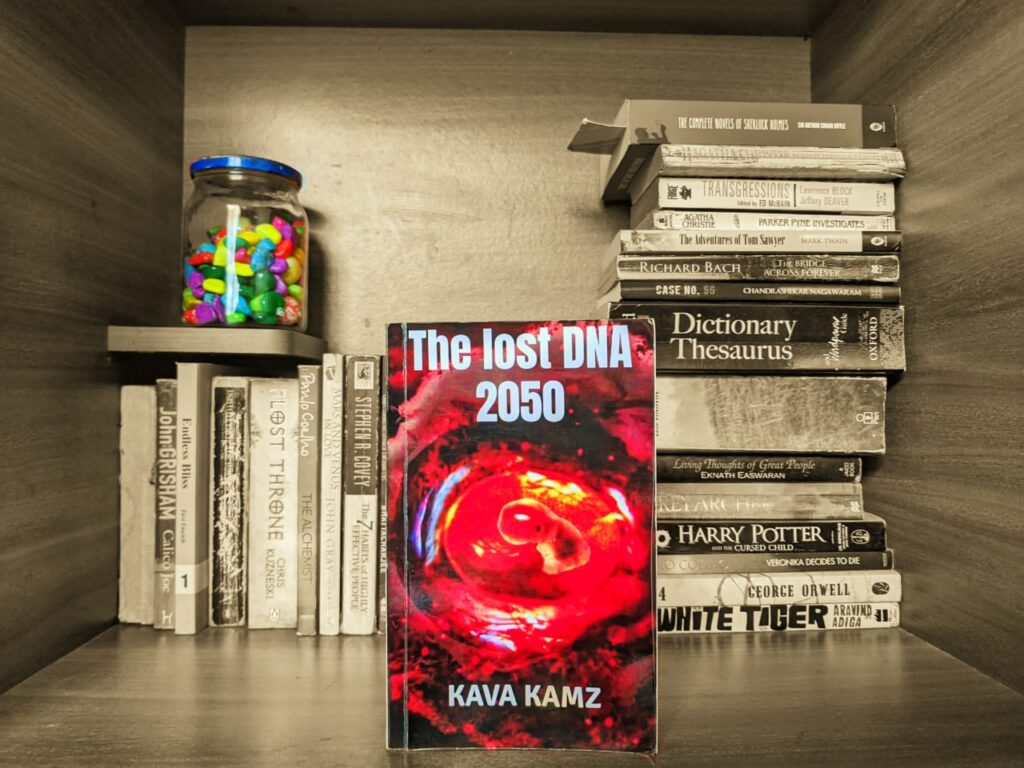The year 2020 has been the most disastrous for human life across the globe since the turn of the millennium. With the Coronavirus Pandemic tightening its grip on mankind, the future looks quite dark and uncertain. While most of the human race was under lockdown, living in continuous fear and anxiety, some souls like debut English novelist Kava Kamz were creating beautiful pieces of literature. This desire and grit to strive in the most demoralizing times is what keeps us alive and kicking!
Coming back to the book, The Lost DNA 2050, I have mixed feelings for it. I have never been so confused after reading a book about whether I should like it or not. For one, I disagree with the author for the most part, especially with the underlying ethos of the story. But then, I did really like the overall concept.
So, with such wavering thoughts, I present to you my review of The Lost DNA 2050 by Kava Kamz.
Plots Summary of The Lost DNA 2050
In simple words, The Lost DNA 2050 is the depiction of what life could be in the year 2050. It is a tale of technology taking over the planet, with the underlying story revolving around three central characters – Lakshmi, Raghu, and Robert.
Lakshmi, who died in the year 2020, is resurrected by a secret group of scientists. Puzzled upon waking up, Lakshmi meets Robert, who is apparently waiting for her for the last 30 years! The story instantly establishes a love angle between the two, which continues right until the climax.
Raghu, on the other hand, is a freakish genius. From early childhood, he took a liking for Siddha science, the scientific literature from the ancient ages. He, along with four of his friends comes under the guardianship of a Siddha research scientist, and the story takes you from places to ages.
Ultimately, the story brings us to a point where we realize that all of them, except Robert, are looking for a secret. The truth is somehow unclear, and rather confusing, throughout, until the end, which I guess was quite absurd. In the end, the story feels quite incomplete even though the concept was quite unique and had a lot of potential.
What I liked About The Lost DNA 2050
Before talking about what I disliked about the novel, I want to talk about what I really enjoyed.
First and foremost, the concept of technology taking over the world, and human life going worse to rogue is something I have always thought about. Kava Kamz portrays the influence of technology in a way that freaks you out. I was feeling uneasy about a couple of instances of imagining a world with driverless taxis and brain transplants.
Secondly, the story itself had a lot of meat. The Lost DNA 2050 could have easily been a trilogy, with separate books on Lakshmi’s resurrection, Thamarai’s exploration of the secret, and the final conclusion. Most of the story (will come back to this in the next section) was interesting and never bored me.
Last but not least, I was mighty impressed with the imagination of the author. Yes, thinking about the future anyone can visualize crazy gadgets, flying cars, and stuff like that, but what Kava depicts is something I could never imagine. Take the different departments and global organizations he mentions or the concepts like tax-paying robots. Purely as a science fiction novel, The Lost DNA 2050 could easily have been among the better ones coming out of India. But sadly, that’s not to be, and I explain why in the next section.
What I Didn’t Like About The Lost DNA 2050
Well, there’s a lot that I dislike about the novel. Keeping my prejudices aside, I want to make this as much fair as I can.
The concept of Siddha scientists didn’t convince me one bit, and I found it amateurish. Don’t get me wrong, it is not that I don’t agree that ancient scholars possessed exquisite knowledge, but the way Kava showcases them is too unreal, at least for me. I totally fail to give in to the idea that they knew each and everything, and yet they let the world become the hell that it is today.
Secondly, the theory of God that the author talks about is flawed on many parameters. I could argue on the metaphysics of the theory which she presents, and I think it lacks on the logical front. For instance, a large part of the theory is based on the idea that God/Gods adapt(s) to the conditions. This not only puts a question mark on the notion of God but also pulls up the archetypal debate about the Ultimate Cause.
I personally feel that instead of tracing the origins of God/Ultimate Cause, exploring the Simulation Theory might have been a much better choice. The storyline was perfectly set for it – a bunch of scientists exploring the reality of Simulation Theory under the guidance of some ancient scholars. That would have been perfect. But I guess, that’s just the enthusiastic reader in me speaking!
Lack of Detailing
What the book truly lacks, despite having a meaty background, is detail. None of the characters have a substantial arc or a solid background story. The character of Raghu, for instance, had a good start, and I was expecting him to explode. But sadly, he didn’t, like all others. That’s one of the biggest issues I have with this novel – it interests you enough to expect that big oomph, but it doesn’t deliver. In the end, I was left wanting more.
The subject Kava has chosen for her first English novel, though she has a couple of books to her credit in Tamil, is absolutely mammoth. Scientific cults throughout the ages have been fascinating human beings, and capturing the entire essence on paper is a herculean task in itself. Therefore, detailing is extremely important for such a novel.
Take Sathyarth Nayak’s debut novel, The Emperor’s Riddles, for example. It has quite similar elements – scientific cults, mysterious murders, and hidden secrets. But what makes Nayak’s work successful is that it doesn’t compromise on details. It has rich characters and strong backgrounds, and it delivers that oomph on more than one occasion.
The lack of detailing in The Lost DNA 2050, I feel, is mainly due to the huge number of characters. There are at least 15 characters who have a significant role to play in the storyline. You get to know each of them in bits and pieces, and that’s definitely not satisfying. And that’s another reason I feel that this could or should have been a multi-book series.
Language & Readability
Apart from the issues I have discussed above, I found two issues with the novel which are technical in nature. First, the manuscript is under-edited and not polished enough. I came across grammatical errors on a number of occasions and spelling mistakes, which made reading confusing in places. And second, the use of adjectives, especially while depicting conversations, is weird.
Since this is Kava’s first English novel, and that too, published independently, one can easily forgive her on this front. Nonetheless, the language and tone of writing are quite simple throughout, and beginners can read it without any problems whatsoever. However, if you’re looking for a technically rich experience, The Lost DNA 2050 may not be the book for you.
The simplistic approach doesn’t hamper the narration, though, and the essence is intact for the most part. I expect Kava to up the ante for her next novel, and that’s not impossible with the amount of technical help we have these days.
Conclusion: Like it or Not?
Well, yes, I like the novel, but only the concept and the potential it packed. I seriously feel that this could have been bigger and better had the characters been fewer or had it been divided into two or three parts. Do I recommend it? Yes, especially to beginners and those looking for sci-fi from India.
Rating: 3/5

Noman Shaikh is the co-founder and editor-in-chief of Bombay Reads. He grew up in Mumbai, a city he loves more than any other, and currently works as a content consultant. His expertise lies in creating high-quality academic and marketing content in the form of blogs, articles, op-eds, etc. Noman has worked with reputed brands, including Economic Times (through Spiral Media), Coinbase (through MattsenKumar), AdEngage, Della Group, GBIM Technologies, VAP Group, etc. For his published portfolio, click here. Contact Noman on noman@bombayreads for engagement.

